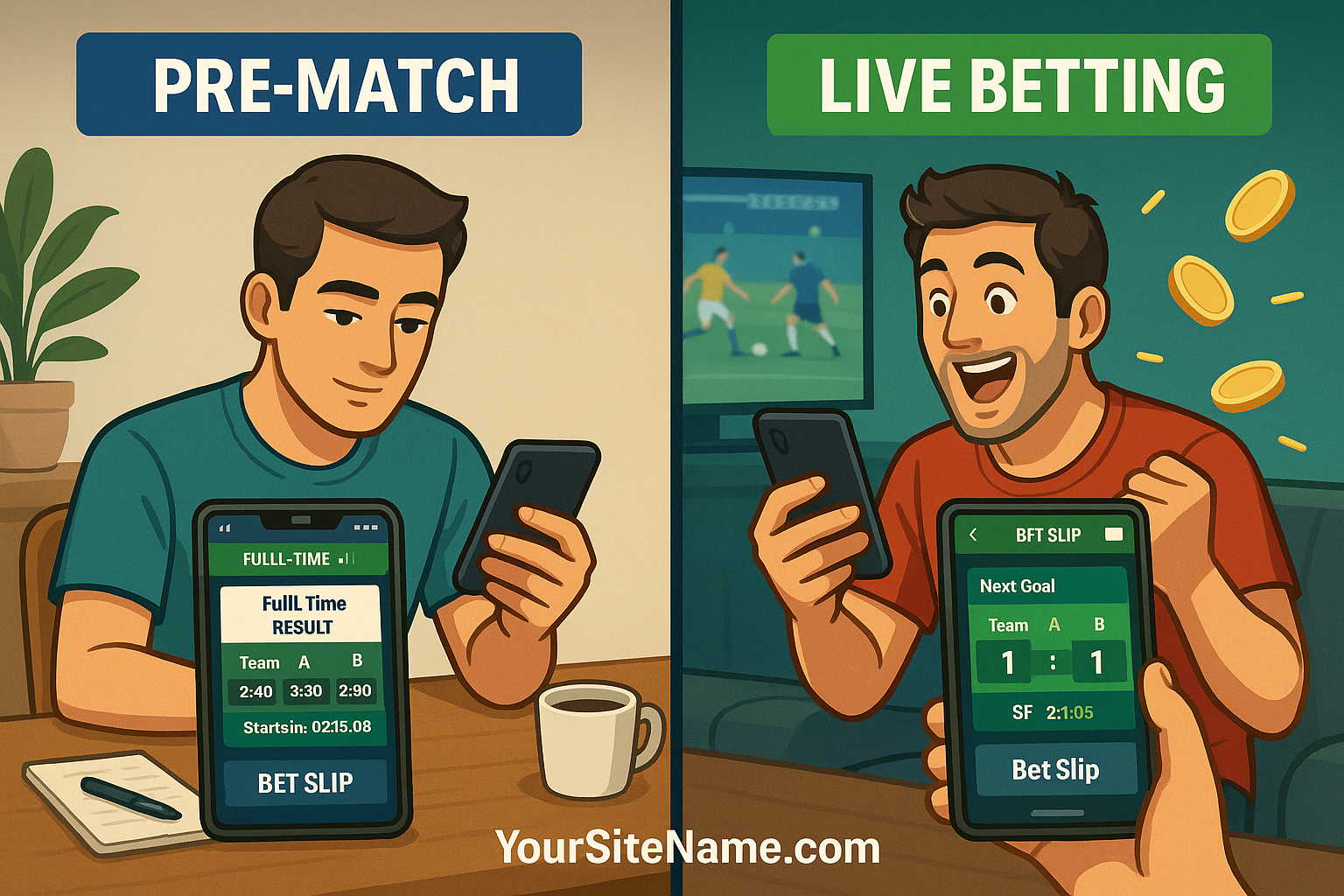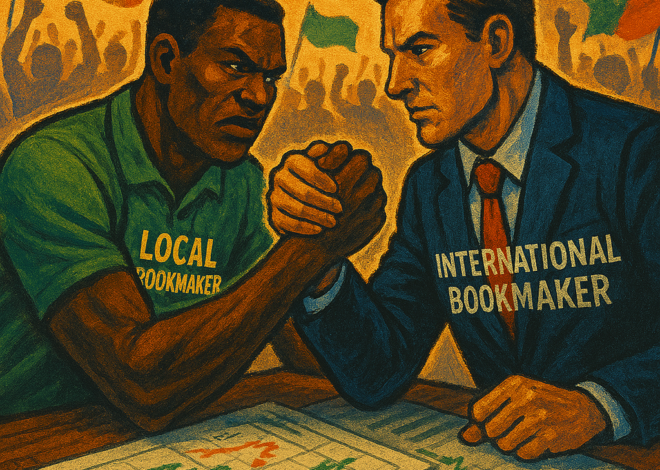
The Strategic Battlefield: Live vs. Pre-Match Betting Explained
The atmosphere inside the sports bar was electric. Eyes darted between multiple screens showing live matches and the glowing smartphones in their hands. I noticed two friends—both serious bettors—with completely different approaches. Jason meticulously researched his bets days in advance, placing all his wagers before kickoff. Meanwhile, Michael hadn’t placed a single pre-match bet, instead watching intently for in-game developments before striking. By night’s end, both walked away with profits, using entirely opposite strategies. This scene perfectly illustrates the fundamental divide in modern sports betting: the methodical world of pre-match wagering versus the dynamic realm of live betting. As a sports journalist who’s covered betting markets for over a decade, I’ve witnessed this tactical divide transform from niche concept to the central strategic question facing every serious punter. During last month’s Champions League semi-finals, I observed professional bettors at a major London betting hub split almost evenly between pre-match specialists and in-play opportunists. The debate over superiority rages on in betting circles, but the truth is more nuanced than most realize. These approaches aren’t competing methodologies—they’re complementary weapons requiring different skills, mindsets, and strategies. Today, I’m pulling back the curtain on both worlds to reveal when, why, and how to leverage each approach for maximum advantage.
Traditional Approach: The Art and Science of Pre-Match Wagering
Pre-match betting represents the classical approach to sports wagering—methodical, research-driven, and patient. Before a ball is kicked or a whistle blown, these bettors have completed their analysis, identified value opportunities, and placed their positions. This traditional methodology centers on predictive analysis rather than reactive decision-making.
The fundamental advantage of pre-match betting lies in its deliberative nature. Without the pressure of rapidly changing odds or developing match situations, bettors can conduct comprehensive research, analyze historical patterns, and make decisions without time constraints. This methodical approach allows for deeper statistical analysis and more thorough consideration of relevant factors than the split-second decisions required during live betting.
The Deep Research Advantage
Pre-match bettors typically develop specialized research frameworks incorporating team form, head-to-head history, tactical matchups, player availability, and situational factors like motivation and scheduling effects. This comprehensive analysis often reveals value opportunities in markets where public perception or historical biases have created mispriced odds.
Line Shopping Opportunities
Another significant pre-match advantage is the ability to compare odds across multiple bookmakers. With hours or days before event start, pre-match bettors can methodically search for the best available price on their selected outcome, extracting maximum value from each betting opportunity. This line shopping can increase returns by 20-30% annually without requiring any improvement in prediction accuracy.
Market Inefficiency Exploitation
Early markets often contain inefficiencies that disappear as kickoff approaches. Sharp pre-match bettors target these opening lines before professional money corrects mispriced odds. This early-mover advantage represents one of the few remaining structural edges available to recreational bettors competing against increasingly sophisticated bookmaking operations.
The Adrenaline Rush: How In-Play Betting Revolutionized Sports Gambling
The explosion of live betting has fundamentally transformed the sports gambling landscape. What began as a niche offering has evolved into the dominant betting format, accounting for over 70% of total wagering volume in many mature markets. This revolution wasn’t just technological—it represented an entirely new betting philosophy focused on reactive analysis rather than predictive forecasting.
Live betting’s primary advantage stems from information asymmetry—the bettor can witness actual game developments rather than merely predicting them. This real-time information creates powerful opportunities when algorithms or pre-set odds fail to fully account for significant in-game developments. During a recent interview with a professional tennis bettor, he explained how he exclusively targets live markets: “Pre-match odds are essentially guesswork about how players will perform. Once I can see actual court positioning, serving rhythm, and movement quality, I have concrete information that models can’t fully incorporate.”
The Momentum Factor
Live betting enables punters to capitalize on psychological factors like momentum shifts that dramatically impact match trajectories but resist pre-game quantification. These momentum swings create temporary market inefficiencies as algorithmic odds adjustments often lag behind the true probability shifts experienced bettors can identify through visual match assessment.
Injury and Tactical Adjustment Opportunities
Perhaps the most powerful live betting advantage comes from real-time evaluation of injuries and tactical changes. While algorithms quickly adjust for scoreline changes, they struggle to properly weight the impact of a key player limping or a significant formation change. Astute live bettors specifically target these situations where human judgment maintains advantages over automated pricing.
The Hedging Dimension
Live markets create powerful hedging opportunities unavailable to pure pre-match bettors. This flexibility enables strategic position management throughout match development, locking in profits or minimizing losses as circumstances evolve. Many professional bettors I’ve interviewed on platforms like 1xbet describe using pre-match positions as foundational bets that they then manage actively through complementary live wagers as matches unfold.
Psychology at Play: Different Mindsets Required for Each Betting Style
Beyond the tactical differences, pre-match and live betting demand fundamentally different psychological approaches. The mental attributes that create success in one arena may actually undermine performance in the other, explaining why few bettors truly excel across both formats.
Pre-match betting rewards patience, methodical analysis, and emotional detachment. The successful pre-game bettor must resist the urge for action, often analyzing dozens of potential opportunities before identifying the select few offering genuine value. This deliberative approach requires comfort with extensive preparation yielding relatively few actual betting positions—qualities that align with traditionally analytical personality types.
Here’s where the psychological requirements dramatically diverge:
- Pre-match betting rewards patience and restraint
- Live betting demands quick decision-making and adaptability
- Pre-match success requires comfort with long research sessions
- In-play excellence depends on rapid pattern recognition
- Pre-match betting involves fewer, higher-conviction positions
- Live betting typically features more frequent, smaller-sized wagers
- Pre-game approach centers on predictive analysis
- In-play strategy focuses on reactive opportunism
Live betting psychology centers on decisiveness, emotional regulation during volatility, and comfort with incompleteness. The successful in-play bettor must make quick judgments with partial information, recognizing that waiting for certainty means missing opportunities as odds rapidly adjust. This ability to make confident decisions without complete information characterizes the most profitable live bettors I’ve studied.
Value Hunting: Where the Real Opportunities Hide in Both Markets
While the methodologies differ dramatically, the fundamental concept of value remains equally central to both pre-match and live betting success. The key distinction lies not in the importance of value but in how and where value opportunities typically emerge within each market type.
Pre-match value typically derives from information advantages or differential interpretation of publicly available data. The pre-game value bettor identifies situations where market odds inadequately account for specific factors—tactical mismatches, undervalued situational angles, or motivational differences that statistical models miss. These opportunities often appear in secondary markets or less-prominent leagues where bookmaker resources for accurate price-setting are limited.
The nature of pre-match value has evolved significantly as bookmaking sophistication has increased. A decade ago, fundamental statistical advantages could generate consistent pre-match profits in major markets. Today, with advanced modeling and sharp money quickly eliminating obvious inefficiencies, pre-match value increasingly requires specialized knowledge niches—obscure leagues, player prop specialization, or situational angle expertise that larger syndicates may overlook.
- Market-opening inefficiencies before sharp money arrives
- Specialized league knowledge beyond bookmaker expertise
- Situational angles underweighted by algorithmic pricing
- Motivational factors missing from statistical models
- Weather impacts insufficiently incorporated into opening lines
Live betting value emerges from entirely different sources: reaction speed advantages, visual information not captured in data feeds, and temporary mispricing during rapid game developments. While pre-match value hunting resembles investment research, in-play value seeking is more akin to trading—identifying temporary market dislocations that create brief but exploitable opportunities.
Bankroll Management: Adapting Your Strategy Across Betting Timelines
The financial approach required for pre-match and live betting success differs as dramatically as the analytical methodologies. Effective bankroll management must adapt to the unique variance patterns, betting volume, and opportunity frequency inherent to each approach.
Pre-match betting typically involves fewer, higher-conviction positions with more substantial research supporting each wager. This approach naturally lends itself to relatively larger stake sizes as a percentage of bankroll, typically in the 2-5% range for strong positions. The lower betting frequency creates longer variance cycles requiring larger bankrolls relative to average stake size to weather inevitable downswings.
During a workshop with professional pre-match bettors, the consensus bankroll recommendation was 40-50 times the standard unit stake—meaning a bettor typically wagering $100 per position should maintain a $4,000-5,000 dedicated bankroll. This conservative approach accommodates the lengthy losing streaks that even skilled pre-match bettors inevitably experience due to lower betting volume.
Live betting demands a fundamentally different financial approach centered on higher frequency, smaller stakes, and more aggressive bankroll velocity. The typical professional in-play bettor maintains significantly smaller stake sizes as a percentage of bankroll—often 0.5-2% per position—but places many more bets, sometimes exceeding 20-30 wagers during a single busy day across multiple events.
The rapidly fluctuating nature of live betting requires greater emphasis on position sizing flexibility. While pre-match bettors often employ relatively consistent stake sizing across similar opportunities, successful in-play bettors adjust position sizes dynamically based on perceived edge magnitude, market liquidity, and existing exposure. This adaptive approach requires more sophisticated bankroll management systems than the simpler percentage models sufficient for pre-match betting.
Building Your Arsenal: Developing Skills for Both Betting Approaches
Rather than viewing pre-match and live betting as competing methodologies, sophisticated bettors increasingly incorporate both approaches within comprehensive betting strategies. Developing complementary skills across both disciplines creates powerful synergies that enhance overall profitability beyond what either approach could achieve independently.
The foundation for effective pre-match betting centers on research processes and information organization. Successful pre-game bettors develop systematic frameworks for analyzing upcoming matches, with particular emphasis on creating proprietary ratings or power numbers that can be compared against market odds to identify value. This methodical approach requires developing specialized data sources, building analytical models, and maintaining detailed records that inform future evaluations.
Live betting skill development follows an entirely different path focused on pattern recognition, quick decision-making protocols, and understanding psychological market dynamics. The most effective training approach involves watching enormous volumes of live sports with specific attention to how various game developments impact match trajectories. Many professionals I’ve interviewed on 1xbet and other platforms describe watching thousands of hours of specific sports with betting markets open but without actually placing wagers—essentially practicing identifying opportunities without financial risk.
The Technology Factor
Both betting approaches increasingly leverage technology, but with different emphases. Pre-match betting technology centers on data organization, statistical modeling, and odds comparison tools that facilitate efficient research and value identification. In contrast, live betting technology focuses on rapid information processing, multiple screen setups for simultaneous event monitoring, and specialized software that highlights potential opportunities based on pre-set criteria.
The Hybrid Bettor Advantage
While specialization in either pre-match or live betting can prove profitable, many of the most successful bettors I’ve studied have developed hybrid approaches that leverage the strengths of both methodologies. This integrated strategy typically begins with selective pre-match positions based on comprehensive research, then uses live betting for position management, exploiting additional opportunities identified through match viewing, and capitalizing on information advantages not fully reflected in dynamic market adjustments.
The developmental journey toward betting proficiency typically begins with pre-match fundamentals before gradually incorporating live elements. This natural progression allows building strong analytical foundations before adding the complexity and psychological challenges of in-play wagering. As skills develop across both disciplines, bettors can increasingly leverage the synergies between approaches to create more robust and profitable overall strategies.
The Evolution Continues: Choosing Your Path Forward
The dichotomy between pre-match and live betting reflects a broader evolution in sports wagering—from purely predictive approaches toward more dynamic, information-driven methodologies. While both approaches maintain distinct advantages, the boundaries continue blurring as technologies advance and betting markets mature.
Your optimal personal approach depends on several factors: analytical strengths, psychological temperament, available time commitment, and technological resources. The methodical, research-intensive nature of pre-match betting suits those with statistical backgrounds and patient dispositions. Conversely, the reactive, pattern-recognition demands of live betting favor those comfortable with rapid decision-making and emotional regulation during volatility.
Rather than definitively choosing one approach, consider your betting journey as an ongoing evolution. Begin with the methodology that aligns with your natural strengths, then gradually incorporate elements from the alternative approach as your skills develop. This balanced perspective recognizes that both pre-match and live betting offer valuable tools that belong in every serious bettor’s arsenal.
The distinction between successful and unsuccessful bettors increasingly centers not on which approach they choose, but rather on how effectively they execute their chosen methodology—maintaining disciplined bankroll management, focusing on value identification rather than outcome prediction, and continuously refining their approach through detailed record-keeping and honest self-assessment. Whether you prefer the methodical research of pre-match analysis or the dynamic opportunism of live betting, these fundamental principles remain equally essential to long-term success.



